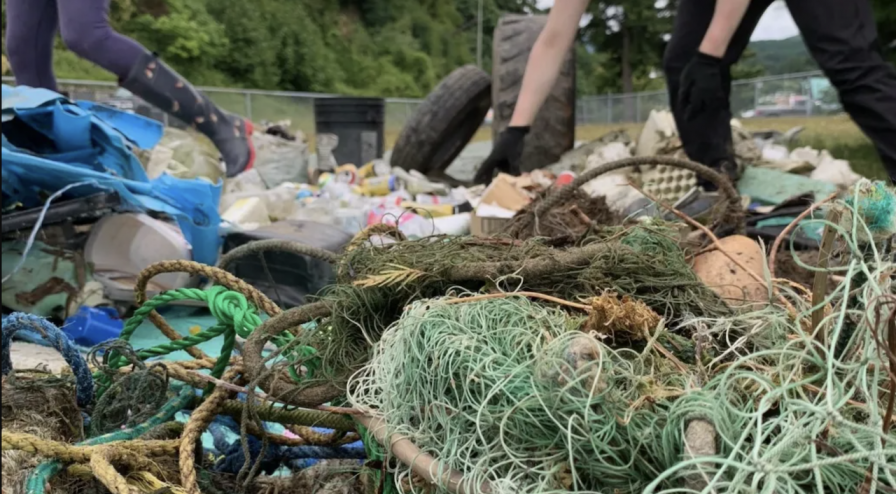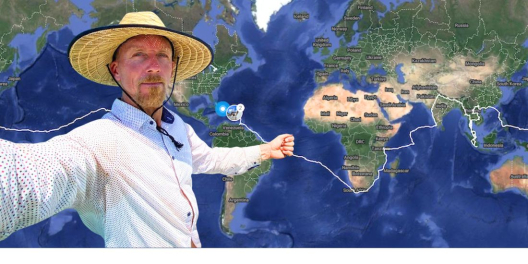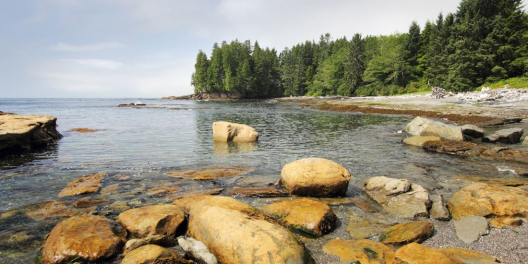Inflatable toys, vacuum cleaner parts, vats of toxic chemicals, bike helmets, coolers, and urinal mats.
This list isn’t a surprise memory test.
It’s just a small sample of what got tossed into our coastal waters after the Zim Kingston freighter spilled part of its load.
“It was horrific. Just seeing fridges on the beach, and Styrofoam broken apart absolutely everywhere, and plastic everywhere,” Jill Laviolette, co-founder of the environmental group Epic Exeo told Canadian Press.
She says what she saw in the early days of the cleanup “shook me to my core.”
Now, over a year following the spill, we’ve recovered only four of the over 100 shipping containers that were thrown into the sea.
The mess is far from cleaned up. Why not? Because items that got strewn from their containers continue to wash ashore all the time.
While groups like Ocean Friendly Port Alberni do a great job of trying to clean up the steady flow of garbage, they can’t address the future. With the amount of freight that passes by our coasts every day, more spills are basically a guarantee.
A recent House of Commons standing committee report warned of ongoing risks.
“The federal government, provinces, and coastal communities are currently not operationally prepared to effectively manage marine cargo container spills,” the report published in October concludes.
It made 29 recommendations for improvements.
Alys Hoyland is with the Surfrider Foundation’s Pacific Rim chapter in Tofino. She told the Canadian Press that similar spills, including 35 containers from the Hanjin Seattle freighter in 2016, didn’t really change policy.
“There’s no formalized mechanism for responding to [spills] in a timely and efficient way, and because of that, the spill was worse than it potentially could have been.”
So basically because we have no plan, bad things like freighter spills get worse.
“What we were seeing was a lot of stuff hit the beach, but then it stayed there for a week (or) 10 days before anybody was asked to clean it up. This meant that at every high tide, these items were being pulled back out into the ocean.”
This damages our environment beyond just making the beach look bad.
During the Kingston spill, two containers went overboard that contained the hazardous chemicals potassium amyl xanthate and thiourea dioxide.
Those containers were never found. They’re either still bobbing around or they’re at the bottom of the ocean somewhere. Are they leaking? No one knows.
But the amount of plastic that went into the water is also hazardous.
It pollutes the environment and the food chain or injures animals before ending up on a beach.
“We see more animals that are suffering because their stomachs are full of plastic,” Laviolette said.
“We have to change our mentality, we have to change our thinking … The ocean is not an infinite resource. It is dying because of our choices.”
The committee recommended that Canada establish a joint spill response task force “to respond to cargo container spills in a timely manner.”
It also stated that shipping companies should be required to publicly release all details of what they were carrying when there is a spill. Right now, they don’t really have to do that.
The committee also recommended allowing legal suits to be taken up years after a spill “given the potential long-term environmental impact affecting communities.”
It also says we need more knowledge about how factors like coastlines, weather, and currents create areas where garbage is more likely to settle.
“Understanding the problem in order to address it upstream is fundamentally what we need here,” said Hoyland.
These are all initiatives that advocates have been seeking for years.
Laviolette said she’s hopeful change is coming, but pressure needs to be kept up.
“We now know the findings, it’s now time for action. The longer that we sit, the sicker that our oceans are going to get.”
Until more action is taken, garbage will just keep washing up.









